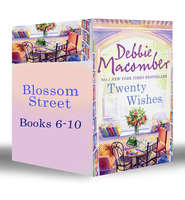По всем вопросам обращайтесь на: info@litportal.ru
(©) 2003-2024.
✖
Alaska Skies: Brides for Brothers / The Marriage Risk
Автор
Год написания книги
2018
Настройки чтения
Размер шрифта
Высота строк
Поля
“Just like the old days when the settlers first got here.”
“Those cabins aren’t on any twenty acres.” Sawyer raised his arms to stop the discussion. “It’d be misleading to let anyone think they were, or that—”
“No one said the cabins had to be on acreage, did they?” Duke broke in. “Besides, to my way of thinking, people shouldn’t look a gift house in the mouth.” He chuckled at his own feeble joke. “House, get it? Not horse.”
“A year sounds fair,” Christian said decisively, ignoring him. “If it doesn’t work out, then they’re free to leave, no hard feelings.”
“No hard feelings.” John nodded happily.
“Now, just a minute,” Sawyer said. Was he the only one here who possessed any sense? He’d come into the Hard Luck Café for a simple cup of coffee, discouraged by the news that Phil was leaving. The morning had rapidly gone from bad to worse.
“How are we going to let women know about your offer?” Ralph asked.
“We’ll run some ads like we said,” Christian told him. “But maybe not in magazines. That’ll take too long. I’ve got a business trip planned to Seattle, so we can put ads in the papers there and I’ll interview the women who apply.”
“Hold on,” Sawyer said, frowning. “We can’t go giving away those cabins, never mind the acreage, without talking to Charles first. Besides, there are antidiscrimination laws that make it illegal to advertise a job for women only.”
Christian grinned. “There’re ways around that.”
Sawyer rolled his eyes. “But we really do need to discuss this with Charles.” Their oldest brother was a silent partner in the O’Hallorans’ air charter service. He should have a voice in this decision; after all, they’d be giving away family-owned cabins and land.
“There isn’t time for that,” Christian argued. “Charles’ll go along with it. You know he will. He hasn’t paid that much attention to the business since he started working for Alaska Oil.”
“You’d better have an attorney draw up some kind of contract,” Ben suggested.
“Right.” Christian added that to his list. “I’ll do it tomorrow. I’ll write the ad this morning and see about getting it in the Seattle paper. It might be best if we placed it in another city, as well. It wouldn’t be much trouble to go down to Oregon and interview women from Portland. I’ve got plenty of time.”
“Hey, good idea,” John murmured.
“I’ll design the application,” Sawyer said reluctantly. This was happening much too fast. “You know, guys...” He hated to throw another wrench in the works, but someone needed a clear head, and it was obvious he’d been elected. “If any woman’s foolish enough to respond, those old cabins had better be in decent shape. It’s going to take a lot of work.”
“I’ll help,” John said enthusiastically.
“Me, too.”
“I expect we all will.” Duke drained the last of his coffee, then narrowed his gaze on Christian. “Just make sure you get a blonde for me.”
“A blonde,” Christian repeated.
Sawyer closed his eyes and groaned. He had a bad feeling about this. A very bad feeling.
One (#u632d220d-9b46-537b-b657-dc2bf1d9206e)
It had been one of those days. Abbey Sutherland made herself a cup of tea, then sat in the large overstuffed chair and propped her feet on the ottoman. She closed her eyes, soaking in the silence.
The morning had started badly when Scott overslept, which meant he and Susan had missed the school bus. Seven-year-old Susan had insisted on wearing her pink sweater, which was still in the dirty-clothes hamper, and she’d whined all the way to school. Abbey had driven them, catching every red light en route.
By the time she arrived at the library, she was ten minutes late. Mrs. Duffy gave her a look that could have curdled milk.
But those minor irritations faded after lunch. Abbey received notice that the library’s budget for the next fiscal year had been reduced and two positions would be cut—the positions held by the most recently hired employees. In other words, Abbey was going to lose her job in less than three months.
She finally got home at six o’clock, tired, short-tempered and depressed. That was when Mr. Erickson, the manager of the apartment complex, hand-delivered a note informing her the rents were being raised.
It was the kind of day even hot fudge couldn’t salvage.
Sensing her mood, the kids had acted up all evening. Abbey was exhausted, and she didn’t think reruns of Matlock were going to help.
Sipping her tea, she wondered what had happened to throw her life off course. She had a savings account, but there wasn’t enough in it to pay more than a month’s worth of bills. She refused to go to her parents for money. Not again. It had been too humiliating the first time, although they’d been eager to help. Not once had her mother or father said “I told you so,” when she filed for divorce, although they’d issued plenty of warnings when she’d announced her intention to marry Dick Sutherland. They’d been right. Five years and two children later, Abbey had returned to Seattle emotionally battered, brokenhearted and just plain broke.
Her parents had helped her back on her feet despite their limited income and lent her money to finish her education. Abbey had painstakingly repaid every penny, but it had taken her almost three years.
The newspaper, still rolled up, lay at her feet, and she picked it up. She might as well start reading through the want ads now, although she wasn’t likely to find another job as an assistant librarian. With cuts in local government spending, positions in libraries were becoming rare these days. But if she was willing to relocate...
“Mom.” Scott stood beside her chair.
“Yes?” She climbed out of her depression long enough to manage a smile for her nine-year-old son.
“Jason’s dog had her puppies.”
Abbey felt her chest tighten. Scott had been asking for a dog all year. “Honey, we’ve already been over this a hundred times. The apartment complex doesn’t allow pets.”
“I didn’t say I wanted one,” he said defensively. “All I said was that Jason’s dog had puppies. I know I can’t have a dog as long as we live here, but I was thinking that maybe with the rent increase we might move.”
“And if we do move,” Abbey said, “you want me to look for a place where we can have a dog.”
Her son grinned broadly. “Jason’s puppies are really, really cute, Mom. And they’re valuable, too! But you know what kind are my favorite?”
She did, but she played along. “Tell me.”
“Huskies.”
“Because the University of Washington mascot is a husky.”
“Yeah. They have cool eyes, don’t they? And I really like the way their tails loop up. I know they’re too big for me to have as a pet, but I still like them best.”
Abbey held out her arm to her son. He didn’t cuddle with her much anymore. That was kid stuff to a boy who was almost ten. But tonight he seemed willing to forget that.
He clambered into the chair next to her, rested his head against her shoulder and sighed. “I’m sorry I overslept this morning,” he whispered.
“I’m sorry I yelled at you.”
“That’s all right.” There was a pause. “I promise to get out of bed when you call from now on, okay?”
“Okay.” Abbey closed her eyes, breathing in the clean shampoo scent of his hair.
They sat together for a few more minutes, saying nothing.
“You’d better get back to bed,” Abbey said, although she was reluctant to see him go.











